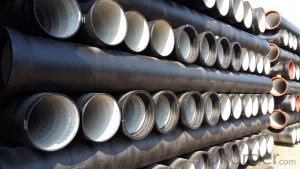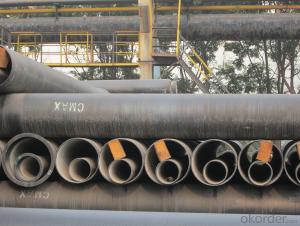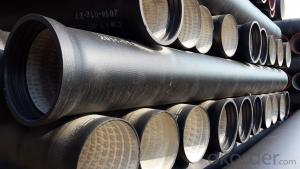Ductile Iron Pipe of China DN200-DN400 EN545/ EN598/ ISO2531
- Loading Port:
- China main port
- Payment Terms:
- TT or LC
- Min Order Qty:
- 20 m.t.
- Supply Capability:
- 50000 m.t./month
OKorder Service Pledge
OKorder Financial Service
You Might Also Like
1. Ductile Iron Pipe Description :
1) Pipes confirm to ISO2531,K9 class,T type joint,6m long,with inside cements lining conform to ISO4179, outside Zinc spraying(130g/m2) and bitumen coating(70μm) conform to ISO8179.
2) Pipe ends: Spigot and socket ends, with 100% SBR rubber gaskets accoding to ISO4633
3) We can do third party inspection according to customer's request.
4) Our products have been sold to many international market,such as Middle East and South East Asia and Africa.
2. Main Features of the Ductile Iron Pipe:
·High yield strength
·High tensile Strength
·High corrosion resistance
·Pressure Resistence
·Anti-corrosion
·Installation is convenient
·Satisfy the highest hygienic standards
3. Ductile Iron Pipe Images:
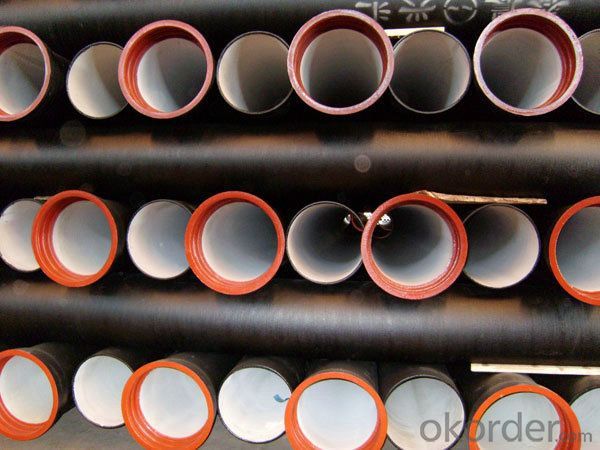
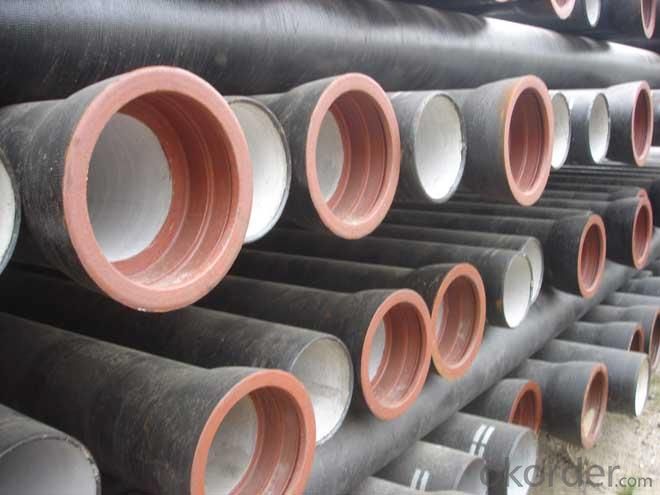
4. Ductile Iron Pipe Specification
Standard: API SPEC 5L 44th eidtion,ASTM A252-98(2007)
Grade: A53 Grades A/B, ASTM A106 Grades B/C,ASTM A179
AWWA, C200, ASTM A139, ASTM A120, API 5L Grade B
X42, X52, X56, X60, X65, X70, X80, X100
Weld Alternatives: LSAW
OD size range: 6.4~44.5mm
Wall thickness: 406.4~1422mm
Length: 3 - 12 m according to requirment
Note: Other grade can also be provided after consulting. Special design are available
for coal slurry conveyance LSAW line tube -- Service.
5. FAQ:
We have organized several common questions for our clients,may help you sincerely:
1).Q: Why would you choose ductile iron pipe rather than other pipe materials?
A:The reasons are obvious for that not only ductile iron pipe possesses the inherent strength and flexibility of ductile iron, combined with proven corrosion protection systems, but also the cost savings can be achieved from design to installation and commissioning.
2).Q:Why can you guarantee the inner of pipes can’t be corroded?
A: High alumina cement mortar lining and sulphate-resistant cement mortar lining. These two special linings are applicable to inner anti-corrosion for sewage pipes, improving resistance to erosion of the sewage components.
- Q:Are ductile iron pipes suitable for irrigation systems?
- Ductile iron pipes are a great fit for irrigation systems. They are renowned for their durability, strength, and resilience, which makes them an excellent choice for various applications, including irrigation systems. These pipes are capable of withstanding high water pressure and are resistant to corrosion, ensuring the efficiency and longevity of the irrigation system. Furthermore, ductile iron pipes have a smooth interior surface that minimizes friction and allows for efficient water flow, guaranteeing optimal operation of the irrigation system. In addition, these pipes have a long lifespan, reducing the need for frequent replacements and maintenance, making them a cost-effective option for irrigation systems. In conclusion, ductile iron pipes are highly suitable for use in irrigation systems due to their durability, strength, corrosion resistance, and efficient water flow.
- Q:Disadvantages of ductile iron pipes
- In most municipal applications, such as water, brine, steam, ductile iron has more corrosion resistance and oxidation resistance than cast steel. Because of the spheroidal graphite microstructure of nodular cast iron, nodular cast iron is superior to cast steel in reducing vibration ability, so it is more beneficial to reduce stress. An important reason for choosing ductile iron is that ductile iron costs less than cast steel.
- Q:Can ductile iron pipes be used in areas with high soil liquefaction potential?
- Ductile iron pipes can be used in areas with high soil liquefaction potential, but certain precautions and considerations need to be taken into account. Soil liquefaction is a phenomenon in which saturated soil temporarily loses its strength and behaves like a liquid during an earthquake or other seismic events. Ductile iron pipes are known for their strength, durability, and resistance to external loads, making them suitable for various applications, including water and wastewater transportation. However, when it comes to areas with high soil liquefaction potential, additional measures should be considered to ensure the pipes' performance and integrity. One crucial factor to consider is the pipe's installation depth. Ductile iron pipes should be installed at a sufficient depth below the ground surface to minimize the effects of soil liquefaction. The depth will vary depending on soil conditions and the level of seismic activity in the area. Consulting with geotechnical engineers and following local building codes and regulations is essential to determine the appropriate installation depth. Furthermore, proper backfill materials and compaction techniques must be employed during the pipe installation process. Using granular materials, such as crushed stone or gravel, for backfill can help improve the soil's stability and reduce the potential for liquefaction. Adequate compaction of the backfill is also necessary to ensure the pipes' stability and prevent settlement or movement during seismic events. Moreover, it is recommended to use flexible joints, such as restrained joints or push-on joints, when installing ductile iron pipes in areas prone to soil liquefaction. These joints allow for some movement and flexibility, which can help absorb the ground's movement during an earthquake, reducing the stress on the pipes and minimizing the risk of damage. Regular inspection and maintenance of the ductile iron pipes are crucial in high soil liquefaction potential areas. Monitoring for any signs of movement, settling, or damage should be conducted, and any necessary repairs or reinforcements should be promptly addressed to ensure the pipes' continued performance and safety. In conclusion, ductile iron pipes can be used in areas with high soil liquefaction potential, but careful consideration of installation depth, proper backfill materials and compaction, the use of flexible joints, and regular maintenance are crucial to ensuring their optimal performance and longevity. Consulting with geotechnical engineers and following local building codes and regulations is highly recommended to ensure the pipes' suitability in such areas.
- Q:Can ductile iron pipes be used for underground geothermal systems?
- Yes, ductile iron pipes can be used for underground geothermal systems. Ductile iron is known for its strength and durability, making it a suitable choice for underground applications. Additionally, it has good corrosion resistance, which is essential in geothermal environments where water and soil conditions can be aggressive.
- Q:What are the specifications for the installation of water ball iron pipes?
- Groove support: according to the groove soil, groundwater, slotted cross section, load conditions and other factors, the design requirements are firm and reliable, to prevent landslides, support, shall not impede the lower pipe and stable pipe.
- Q:How can the ductile iron pipe elbow be fixed?
- The utility model relates to a groove connecting pipe which has the function of sealing and sealing, and mainly comprises three parts: a sealing rubber ring, a clamping band and a locking bolt. The inner rubber sealing ring is arranged on the outer side of the connecting pipe and is matched with the pre rolling groove, and then the outer ring is buckled on the rubber ring, and then can be fastened with two bolts. Because of the special sealing structure design of the rubber sealing ring and the clamp hoop, the groove connecting piece has good sealing property, and the sealing property is enhanced correspondingly with the increase of the fluid pressure in the pipe.
- Q:How do ductile iron pipes handle ground settlement?
- Ductile iron pipes have the ability to withstand ground settlement due to their flexibility and resilience. The inherent ductility of the material allows the pipes to absorb and distribute the stress caused by ground movement, minimizing the risk of damage or failure. Additionally, the joints of ductile iron pipes are designed to provide flexibility, allowing for slight movement and accommodating ground settlement without compromising the integrity of the pipeline system.
- Q:How do ductile iron pipes handle traffic vibrations?
- Ductile iron pipes are highly resistant to traffic vibrations due to their inherent strength and flexibility. These pipes have the ability to absorb and dissipate the energy generated by traffic vibrations, minimizing any potential damage or stress on the pipes. Additionally, their sturdy construction and high tensile strength make them less susceptible to cracking or breaking under the impact of traffic-induced vibrations. Overall, ductile iron pipes provide excellent performance and durability in handling traffic vibrations.
- Q:What are the different types of joints used with ductile iron pipe?
- The different types of joints commonly used with ductile iron pipe include push-on joints, mechanical joints, restrained joints, flanged joints, and welded joints. Each type of joint offers different benefits and is used depending on the specific requirements of the installation.
- Q:Are ductile iron pipes resistant to UV radiation?
- Ductile iron pipes do not possess resistance against UV radiation. The exposure to UV radiation can lead to the deterioration and weakening of the material as time goes by. In order to safeguard ductile iron pipes from UV radiation, they must be covered or enveloped with a UV-resistant substance or coated with an appropriate protective layer. Furthermore, it is essential to conduct regular inspections and maintain the pipes adequately to identify and rectify any indications of UV damage.
1. Manufacturer Overview |
|
|---|---|
| Location | |
| Year Established | |
| Annual Output Value | |
| Main Markets | |
| Company Certifications | |
2. Manufacturer Certificates |
|
|---|---|
| a) Certification Name | |
| Range | |
| Reference | |
| Validity Period | |
3. Manufacturer Capability |
|
|---|---|
| a)Trade Capacity | |
| Nearest Port | |
| Export Percentage | |
| No.of Employees in Trade Department | |
| Language Spoken: | |
| b)Factory Information | |
| Factory Size: | |
| No. of Production Lines | |
| Contract Manufacturing | |
| Product Price Range | |
Send your message to us
Ductile Iron Pipe of China DN200-DN400 EN545/ EN598/ ISO2531
- Loading Port:
- China main port
- Payment Terms:
- TT or LC
- Min Order Qty:
- 20 m.t.
- Supply Capability:
- 50000 m.t./month
OKorder Service Pledge
OKorder Financial Service
Similar products
New products
Hot products
Related keywords

